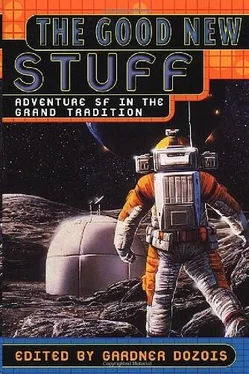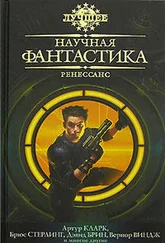Стивен Бакстер - The Good New Stuff
Здесь есть возможность читать онлайн «Стивен Бакстер - The Good New Stuff» весь текст электронной книги совершенно бесплатно (целиком полную версию без сокращений). В некоторых случаях можно слушать аудио, скачать через торрент в формате fb2 и присутствует краткое содержание. Год выпуска: 2002, ISBN: 2002, Издательство: St. Martin's Griffin, Жанр: Фантастика и фэнтези, на английском языке. Описание произведения, (предисловие) а так же отзывы посетителей доступны на портале библиотеки ЛибКат.
- Название:The Good New Stuff
- Автор:
- Издательство:St. Martin's Griffin
- Жанр:
- Год:2002
- ISBN:0-312-26456-9
- Рейтинг книги:3 / 5. Голосов: 1
-
Избранное:Добавить в избранное
- Отзывы:
-
Ваша оценка:
- 60
- 1
- 2
- 3
- 4
- 5
The Good New Stuff: краткое содержание, описание и аннотация
Предлагаем к чтению аннотацию, описание, краткое содержание или предисловие (зависит от того, что написал сам автор книги «The Good New Stuff»). Если вы не нашли необходимую информацию о книге — напишите в комментариях, мы постараемся отыскать её.
The Good New Stuff — читать онлайн бесплатно полную книгу (весь текст) целиком
Ниже представлен текст книги, разбитый по страницам. Система сохранения места последней прочитанной страницы, позволяет с удобством читать онлайн бесплатно книгу «The Good New Stuff», без необходимости каждый раз заново искать на чём Вы остановились. Поставьте закладку, и сможете в любой момент перейти на страницу, на которой закончили чтение.
Интервал:
Закладка:
Nordley has yet to publish a novel, although a fix-up of the "Trimus" stories shouldn't be that hard to produce. A story collection is also long overdue, although none is forthcoming. Until then, you'll just have to look for him in the magazines, where he will surely continue to deliver solid and suspenseful science fiction adventures, based in accurate science but with a strong Sense of Wonder kick, for years to come.
… to establish a single planetary society in which all three spacefaring races take equal part: to find and develop common standards of civilized behavior, which may serve as a model for galactic civilizations to come.
— Compact and Charter of the Planet Trimus, Preamble
The human ship, almost four Charter units long with a huge square cloth sail, was new to Lieutenant Drinnil'ib. What, he wondered, were primitivists doing this far north? He hailed the ship, but instead of a verbal response, his voice brought a scurrying of the small two-legged beings around its deck. Before he could repeat the hail, a sharp, explosive, report split the air and something with a singing line attached went "thwunk" into the sea beside him.
What in the name of the Compact? he thought. The line brushed over his nose and he stuck his tongue out to grab and examine it. The line came under tension, and he let it slide through his manipulators until the end came along.
Pollution! The thing was sharp. It nicked the muscular fingers on one fork of his tongue before he clamped down on the line with the other, forcing the humans to try to reel him in with it. That should slow things down a bit, he thought. He raised a front claw and wrapped the line around it to ease the strain on his tongue. Then he held the object in front of his eyes. It was solid metal of some sort, and barbed: something that could have killed him if it had hit him in the wrong spot.
The thought and his reaction were almost simultaneous; he snapped his tail and bent his body downward. Not an eighth of a heartbeat later a tinny pop reached him through the water and another of the things zapped by. They were trying to kill him!
He let go, pulled a knife from his pouch, and slashed the line between the barbed missile and his foot. Then he swam first toward and then away from the ship, holding the line with his foot, and felt a satisfying give in the line after it jerked taut. He had some momentary misgivings— humans were fragile and he might have hurt one. But perhaps not: the tension on the line resumed quickly. Another slash of the knife took care of that. Drinnil'ib shook the remains of the rope from his claw, dove beneath the ship, and kept pace just below its hull.
Reaching back to his pouch, he replaced the knife with his gun and contemplated the plank belly of the offending vessel. Two, he thought, could play perforation. It took ten explosive rounds to put a fair-sized hole in the hull; the layers of polluting timbers were a twelfth of a Charter unit thick. But when he was finished, the ship was leaking so badly it would have to head for port too quickly to bother any other Do'utian.
Satisfied, he breached the surface immediately behind the ship, fired a shot in the air and roared a challenge: "I am planetary monitor Lieutenant Drinnil'ib and you have just assaulted me. What in the name of eternal repudiation do you think you are doing?"
Shouts sounded and sails rose. He grabbed the rudder of the ship with his front foot and wiggled it vigorously. Finally a face surrounded by reddish hair appeared over the railing on the rear of the boat.
"What in hell are you doing here, Monitor?" it shouted at him. "This is primitive territory— you damn techs are supposed to leave us alone."
"Not when people start getting killed," Drinnil'ib replied in a more conversational tone. "You can play your games but you have to observe the limits."
"Don't screw around in what you techs can't understand," it yelled. "Just leave us alone!"
Drinnil'ib rocked the ship again. "You're going to sink right here if you don't acknowledge that you can't sail around shooting people wherever you are. It's against the Compact."
"All right, all right, I hear you. Shooting at you was a big mistake. But next time, stay out of human whaling waters, Fish-man."
The polluting idiot didn't seem to show a trace of remorse, however Drinnil'ib thought he might be misinterpreting their body language. Just to be sure they didn't misinterpret his, Drinnil'ib gave the harpoonists something very easy to understand: he emptied his lungs of moisture-filled air right at them, soaking the speaker and sails. Then he kicked the ship away in disgust and sounded. Ten Charter units deep Drin put the barb in an evidence wrap, exchanged his gun for his communicator, and filed his report. He'd just gotten an object lesson on how some of the killings might have happened, but he would need human help to get to the bottom of it. A good excuse to look up an old colleague. With measured beats of his muscular tail, he headed for the northern reaches of the western continent.
As the tide-locked satellite of a superjovian infrared primary, Trimus has three symmetry axes: north-south, east-west, and inner-outer. This gives it three sets of geographic poles and three distinct climatic regions that allow for all three species to live in comfort. The arctic and antarctic match similar regions on Do'utia. The cool region surrounding the far pole matches the climate of the most populated areas of Kleth. The Earth-like near hemisphere is warmed both by Aurum and Ember, and ranges from temperate near the east and west poles to tropical directly beneath Ember. Trimus's close orbit about Ember gives it an effective day which is about twice the day of the Kleth homeworld, one and a half times that of Earth, and three times that of Do'utia. For the last, however, what counts is the 407-day polar season cycle produced by the half-radian inclination of Trimus's orbit to the local ecliptic, and this is almost the same as on Do'utia.
— Planet Monitor's Handbook, Introduction
The morning sun was a tiny red ball in the mists next to the great ruddy crescent of Ember, as Drinnil'ib propelled himself upstream toward the human city with powerful tail strokes. The murders, he thought, struck at the purpose of Trimunian civilization by pitting one species against another.
Trimus was supposed to be the galactic laboratory for peaceful interspecies cooperation. But Ember had circled Aurum eight-cubed times since its settlement, and only the collective memory of the Kleth and the mechanical memories of the Humans went back that far. Some, he knew, felt this purpose had faded along with the need for experiment; preempted by distances of time and space so great that the residents of Trimus no longer represented the cultures that sent them. If they ever had, he thought wryly. Beings who would leave their home worlds forever to take part in an idealistic interstellar experiment may have had more in common with each other than with their various contemporaries.
But as far as Drin was concerned, the millennial-old civilization of Trimus had become its own reason for existence. Forget the rest of the galaxy and their occasional starships: to survive in peace with each other and their planet, its residents had to put the discipline of reason ahead of the natural inclination to group things by shape. To be a monitor was a calling, and he had no greater loyalty than to his world and its ideals, except, perhaps, to reason itself.
Headquarters said that Mary Pierce would be waiting for him at the marina landing past the watchtower at the base of the main channel bar, wherever that was… there! He caught the echo and eased himself to the right and into the deep cool channel. The harbor bottom was a backwater fairyland of human bubbles and Earth-life reefs, and the channel led through that like a wide black road. At its end, the cigar shapes of human submarines lay in a neat row, safe on the bottom from the winter ice. He put his legs down, released a bubble to settle himself firmly on the concrete, and with even measured strides hoisted his body into the warm air of the eastern continent.
Читать дальшеИнтервал:
Закладка:
Похожие книги на «The Good New Stuff»
Представляем Вашему вниманию похожие книги на «The Good New Stuff» списком для выбора. Мы отобрали схожую по названию и смыслу литературу в надежде предоставить читателям больше вариантов отыскать новые, интересные, ещё непрочитанные произведения.
Обсуждение, отзывы о книге «The Good New Stuff» и просто собственные мнения читателей. Оставьте ваши комментарии, напишите, что Вы думаете о произведении, его смысле или главных героях. Укажите что конкретно понравилось, а что нет, и почему Вы так считаете.











